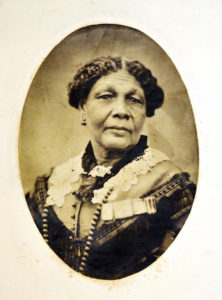
Mary Seacole
*This date celebrates the birth of Mary Grant Seacole, a Jamaican nurse and abolitionist, in 1805.
Mary Jane Grant was born in Kingston, Jamaica. Her father was a Scottish soldier, and her mother was Jamaican. Seacole learned her nursing skills from her mother, who ran a boarding house for invalid soldiers. Although technically 'free,' being of mixed race, she and her family had few civil rights; they could not vote, hold public office, or enter professions.
In 1836, she married Edwin Seacole, but he died in 1844. Seacole was a seasoned traveler who visited other parts of the Caribbean before her marriage, including Cuba, Haiti, the Bahamas, Central America, and Britain. On these trips, she complemented her knowledge of traditional medicine with European medical ideas. In 1854, Seacole traveled to England and approached the War Office, asking to be sent as an army nurse to Crimea, where there were poor medical facilities for wounded soldiers. She was refused.
Undaunted, Seacole funded her trip to the Crimea, where she established the British Hotel near Balaclava to provide 'a mess-table and comfortable quarters for sick and convalescent officers. She also visited the battlefield, sometimes under fire, to nurse the wounded and became known as 'Mother Seacole.'
Her reputation rivaled that of Florence Nightingale. After the war, she returned to England, destitute and ill-healthful. The press highlighted her plight, and in July 1857, a benefit festival was organized to raise money for her, attracting thousands of people. Later that year, Seacole published her memoirs, 'The Wonderful Adventures of Mrs. Seacole in Many Lands.
Mary Seacole died in London on May 14, 1881, and is buried in St Mary's Catholic cemetery, Kensal Green.